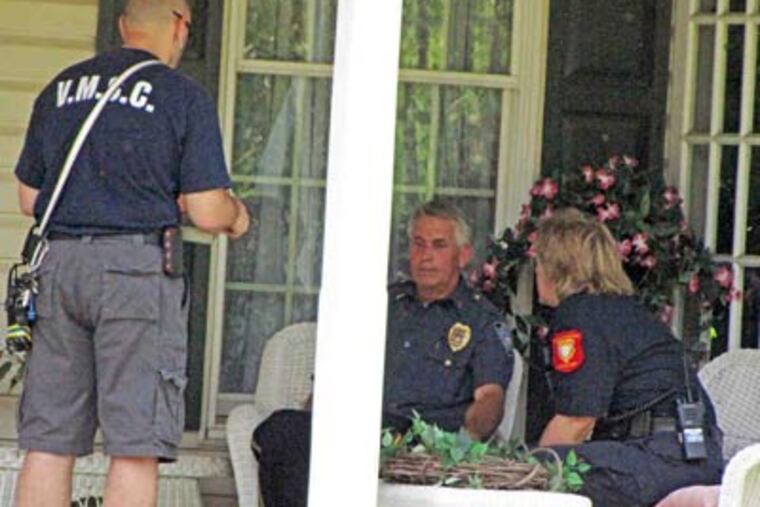Hatfield police officer cleared in son's shooting death
Prosecutors on Friday cleared Hatfield Police Lt. Eric B. Schmitz of criminal culpability in the fatal shooting of his son, Stephen, June 8 in their Towamencin home.

Prosecutors on Friday cleared Hatfield Police Lt. Eric B. Schmitz of criminal culpability in the fatal shooting of his son, Stephen, June 8 in their Towamencin home.
In a detailed five-page report compiled from interviews, medical records and analysis of evidence taken from the scene, investigators said that the career officer "reasonably believed deadly force was necessary to protect himself against death or bodily injury."
The report described a scene in which Schmitz, 56, tried to reason with the boy, who was threatening him with a hunting knife. The teenager lunged, slashing at his father with the five-inch blade and knocking him down in the process.
When the high school junior pulled his arm back for another swipe of the knife, Schmitz pulled his service weapon from its holster and fired.
"He didn't have any other choice," Montgomery County District Attorney Risa Vetri Ferman said.
The report lays out the story of a family struggling to help a mentally troubled child before he hurt himself or others.
"Lt. Schmitz and his wife, Lori, were very concerned about Stephen's issues and were doing everything possible to get [him] counseling and treatment," the report says.
The Schmitz family could not immediately be reached for comment Friday afternoon. Hatfield police officials did not return calls.
Stephen Schmitz's death last month hit students and faculty at North Penn High School hard, in part because few knew that the lacrosse player and theater fan had struggled so severely with mental illness.
But for family members, his mental state - and sometimes violent threats - were a daily part of life in the two months before his death, according to the district attorney's report. They did their best to adapt.
The Schmitzes had sought psychiatric care for their son, who was found to have severe depression and anxiety. When he repeatedly told his father and siblings he hated them, they responded with expressions of love.
And then there were the practical steps. In April, Schmitz removed all his personal handguns from the family's house on the 100 block of Oxford Road, investigators said. His service weapon often stayed locked in the trunk of his car.
The family devised a "safety plan" in case Stephen attacked them. At night, Schmitz slept with his metallic police-issue flashlight beneath his pillow.
On May 25, Towamencin police were called to the home when Stephen Schmitz tried to strangle his 18-year-old brother Andrew, then threatened to kill himself, pointing a knife at his stomach.
"I can't live my own life. There are too many laws," he said as responding officers put him in handcuffs. "I just want to . . . die."
The family decided to seek involuntary psychiatric commitment that day.
Stephen Schmitz remained hospitalized at the Horsham Clinic for 12 days and by June 7 - the day of his release - had shown improvement.
But even as counselors met with his family, an argument broke out between the boy and his parents over a confiscated cellphone.
When Stephen Schmitz got home, things got worse. He cursed his sister. He begged his father to admit he hated him.
Then, the next day, when Schmitz came home from work early to check on his son, the teen came after him with the hunting knife.
In the days after the shooting, some asked why Schmitz - a trained marksman - would shoot his son in the torso rather than take a disarming shot to the arm or the leg. Ferman said Friday that Schmitz's account of how the attack played out matched physical evidence found at the scene.
Their positions - father knocked to the laundry room floor, son standing over him with little space between them - suggest there was no other easy place for Schmitz to aim his weapon, her report says.
"Lt. Schmitz acted with full legal justification in his use of deadly force," according to the report.